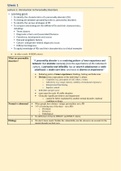Week 1
Lecture 1: Introduction to Personality Disorders
• in other words → DSM criteria
What are personality
disorders?
• Enduring patter of inner experience: thinking, feeling and behaviour
• Deviates from expectations of the individual’s culture
o Cognition (e.g. perception of self, others, events)
o Affectivity (e.g. range, intesity, stability of emotional responses)
o Interpersonal functioning
o Impulse control
• Inflexible and pervasive
• onset must be early → stable duration
• Clinically significant distress and impairment
o cannot be better explained by another mental disorder, medical
condition or drugs
Normal vs abnormal • When people have distinct / unique personalities not a PD
• 3 P’s (if missing any of the three – not a PD)
o Persistent
o Pervasive
o Pathological
• No differences between DSM-IV and DSM-5 criteria
Etiology • We don’t know much. Neither the vulnerability nor the stressors can account for the
mental disorder on their own
, • A lot of comorbidity between personality disorders → suggests a physical or biological
basis for them
• But research still in early stages
Clusters of PD • A – 5%
• B – 1.5%
o Borderline etc (more well known, because these people interact with society a
lot → self-harm, violence, crime)
• C – 6%
Cluster A • Paranoid PD
(Atypical) o Pattern of distrust and suspicion
o Very suspicious about person’s intentions or motives
o More men
o E.g- Stalin. Not able to trust anyone, not even closest allies. Would
overanalyse every single interaction.
• Schizoid PD
o Detachment/ no interest in social interactions
o Lives with limited interaction, isolated
o More observant, than participation
o No interest in intimacy or sex
o E.g- Dexter in early episodes
• Schizotypical PD
o An acute discomfort in close relationships
o Will often suffer from perceptual distortions, an everyday thing that isnt linked
to stress (as psychosis is)
o Don’t get how relationships work, don’t have many
o Strong link between schizotypical and one depressive episode
o E.g- Willy Wonka
Cluster B • Antisocial
(BooHoo) o Disregard of, and violation of other people’s rights
o Person does what they want, and whatever happens as a result, they don’t
really care
o Low empathy, legal problems,
o Conduct disorder
o Inflated and arrogant attitudes, self-assured, cocky
o Not the same thing as psychopathy. Most psychopaths will meet criteria for
ASPD. But many anti socials aren’t psychopaths
o More men
o E.g- Hannibal Lecter
• Borderline
o Pattern of instability, how one feels and interpersonal relationships
o Predominately women
o Self harm, impulsiveness, cannot be separated/rejected, chronic feelings of
emptiness
o E.g- Angelia Jolie, Amy Winehouse, Lindsey Lohan
• Histrionic
o “Hysteria”
o “Hysteria neurosis”
o Excessive emotionality and attention seeking → being the center of attention
, o When they are not the center of attention = feel empty and uncomfortable
o More women
o Often as the ‘victim’ or the ‘princess’. Sexually provocative behaviour used as
an easy way to get attention
o E.g- Kanye West, Kim?
o Overlap with BD
• Narcissistic
o Pattern of grandiosity and lack of empathy → me me me
o Often snobbish, disdainful and patronizing → and you are not
o More men than women
o E.g- Kim Kardashian, Donald Trump, Kanye West
Cluster C • Avoidant Personality Disorder
(Control –in order to o Sensitive, inadequate, shy away from social interactions
deal with fear of o Feel inferior
situations) o Cannot be critisied or rejected
o Shy, timid, lonely, isolated
o Overlap with schizoid (social isolation)
o E.g- Micheal Jackson
• Dependent
o Submissive, clingy and need to be taken care of
o I can calm myself if others are near
o Worried about disapproval or criticism
o E.g- Buster Bluth (Arrested Development)
• Obsessive-compulsive PD
o Preoccupation with order, perfectionism, control
o Rules and systems must be adhered to
o Becomes difficult to prioritise tasks, when everything becomes importance
o Linked to violence in the home
o Difference to OCD:
▪ Interpersonal element → care that other stick to the rules (not just
themselves, such as OCD).
▪ More ego-syntonic than OCD, where you like your own framework
(which is ego-dystoinic where you are victim to rules)
▪ No magical thinking
o E.g- Steve Jobs
,





